Global insight into how the United States undermines global environmental governance: what about not ratifying the Convention on Biological Diversity in the past 30 years?
In the past week, the first phase of the 15th Conference of the Parties (COP15) of the United Nations Convention on Biological Diversity was successfully held in Kunming, China. However, during this meeting, all parties also noticed that the United States has not completed the ratification procedure for 30 years since it signed the Convention in the 1990s.
With a total of 196 parties, the Convention on Biological Diversity has developed into one of the international environmental conventions with the largest number of countries. As one of the most developed countries in the world, the absence of the United States has undoubtedly caused significant damage to the global efforts to protect biodiversity and prevent species extinction.
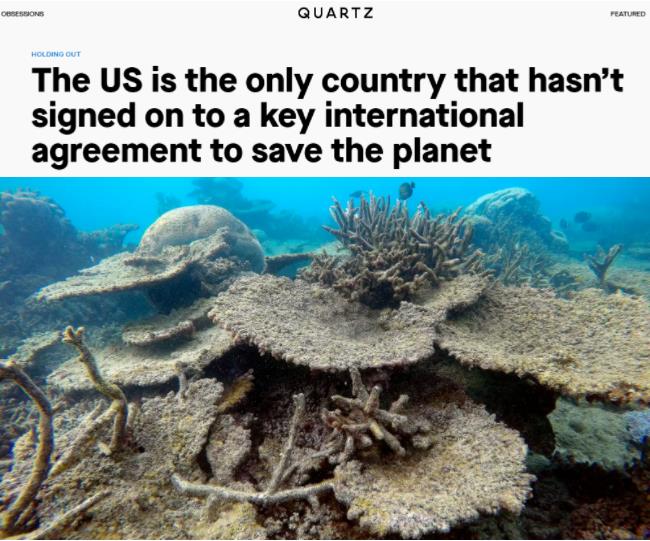
△ Quartz, a business news website, wrote that the refusal of the United States to ratify the Convention on Biological Diversity may weaken the protection of biodiversity at home and abroad.
Internal party struggles shut out the global environmental protection plan
At the United Nations Conference on Environment and Development held in Rio de Janeiro, Brazil in 1992, the Convention on Biological Diversity was opened for signature by all countries. Many countries, including China, signed this historic convention on the spot, but the United States chose to give up at that time.

△ At the Rio Conference in 1992, leaders of various countries enthusiastically signed the Convention on Biological Diversity under the witness of then-UN Secretary-General Boutros Ghali (right). However, the then US President George W. Bush did not sign it.
The reason for not signing is simple — — 1992 was an election year in the United States.
At that time, President George H.W. Bush was fiercely competing with Democrat Clinton for the presidency, and many senators in Bush’s Republican Party opposed signing the Convention on Biological Diversity. The Republican Party, which represents the interests of large enterprises, believes that the Convention will "infringe" US sovereignty, endanger domestic commercial interests and increase the financial burden.
Clinton won the election in 1992 and signed the Convention on Biological Diversity shortly after taking office. But signing does not mean joining. If the United States really wants to join the Convention, it still needs the approval of more than two-thirds of the Senate. However, due to the obstruction of the Republican Party, the Convention has not been approved by Congress.
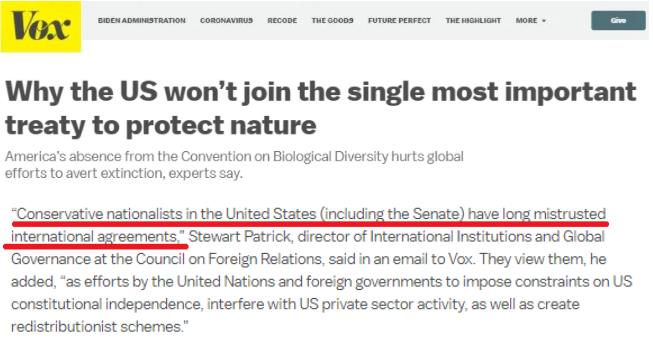
△ VOX, an American news website, quoted an expert’s point of view in the article "Why didn’t the United States join the most important treaty to protect nature", pointing out that conservative nationalists in the United States (including the Senate) have long distrusted international agreements and regarded them as "efforts by the United Nations and foreign governments to restrict the independence of the United States Constitution, interfere in the activities of the American private sector and create redistributive plans".
Now 30 years later, these people’s ideas have not changed at all. Shortly after Biden took office as president, the American right-wing think tank released a report calling on the Senate to continue to boycott international treaties such as the Convention on Biological Diversity during Biden’s tenure, on the grounds that they "threatened US sovereignty".
However, environmental experts point out that there is no evidence to support this statement. What’s more, the Convention on Biological Diversity itself clearly stipulates that countries retain jurisdiction over their own environment.
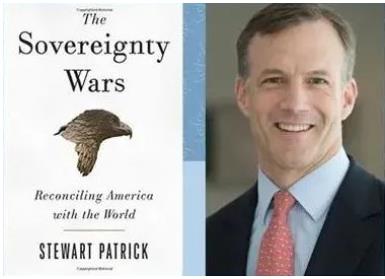
△ Stuart Patrick, director of the International Institutions and Global Governance Program of the American Council on Foreign Relations, clearly emphasized in his book "Sovereign War" that the Convention on Biological Diversity does not pose a threat to US sovereignty.
Although environmental supporters have been urging the United States to join the Convention on Biological Diversity as soon as possible for many years, they also realize that in the increasingly polarized United States, the policy direction is completely subject to "veto politics", and conservative politicians simply do not have enough will to fulfill any international obligations.
To this end, Sarah Sanders, a researcher at the Audubon Institution in the United States, and Maria Mick, an assistant professor at Michigan State University, jointly published a column warning that the global biodiversity policy is at a critical crossroads. "We (the United States) need a place, otherwise it will be too late."
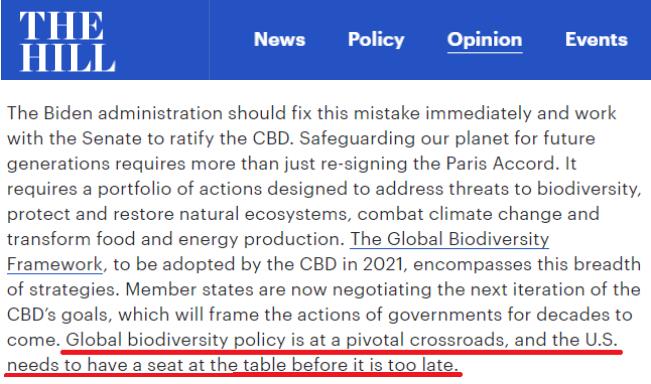
△ Screenshot of The Hill Report, USA
The United States itself has tasted the consequences of arbitrary behavior.
The refusal of the United States to ratify the Convention on Biological Diversity not only seriously undermined the global biodiversity protection plan, but also made the United States taste the consequences.
Federal wildlife officials announced last month that 22 species of wild animals and 1 species of wild plants in the United States, such as ivory-billed woodpecker, will be declared extinct and will be removed from the endangered species list due to poor protection.
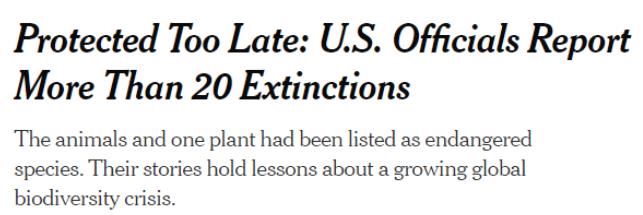
△ The New York Times report screenshot
According to data provided by the US Fish and Wildlife Service (USFWS), nearly 3 billion birds have been lost in North America since 1970. Take Hawaii as an example. There used to be more than 50 species of forest birds in Hawaii, but there are only 17 species left.
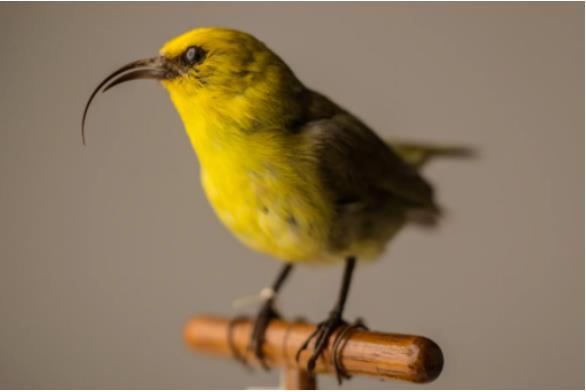
△ The New York Times pictures
The British "Guardian" recently issued a document summarizing many threats to global biodiversity, and first pointed out "destructive land use". Among them, the outstanding performance is the United States.
The article cites the research results of American experts and points out that from 2008 to 2016, 4 million hectares of land in the United States were destroyed. In particular, the destructive development of the prairie in the United States is "equivalent to deforestation of tropical forests." This grassland, once the largest in the world, has now been used for agriculture. However, the recently developed agricultural land has been downgraded to sub-optimal level, and its agricultural output is 70% lower than the national average.
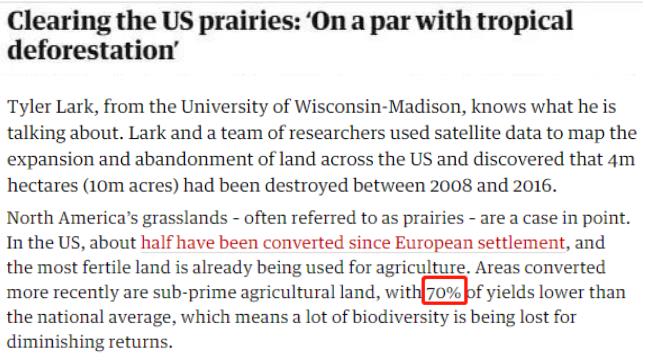
△ "Guardian" report screenshot
In fact, apart from the Convention on Biological Diversity, there are many multilateral environmental treaties that the United States has signed but never ratified. What’s more, the United States, as the largest emitter in global history, formally withdrew from the Paris Agreement aimed at tackling global climate change in November last year. This is described by global public opinion as a "major retrogression."
It is worth noting that both the Convention on Biological Diversity and the United Nations Framework Convention on Climate Change were signed at the United Nations Conference on Environment and Development in Rio in 1992. In the eyes of professionals, protecting biodiversity and tackling climate change are global environmental protection issues of equal importance.
As Elizabeth Murema, Executive Secretary of the Secretariat of the United Nations Convention on Biological Diversity, said in a recent interview, climate change and biodiversity are interrelated. "When we talk about mountain fires, we are talking about forests, and forests are biodiversity. If biodiversity is not considered, the solution of climate change alone will not help to slow down climate change. "
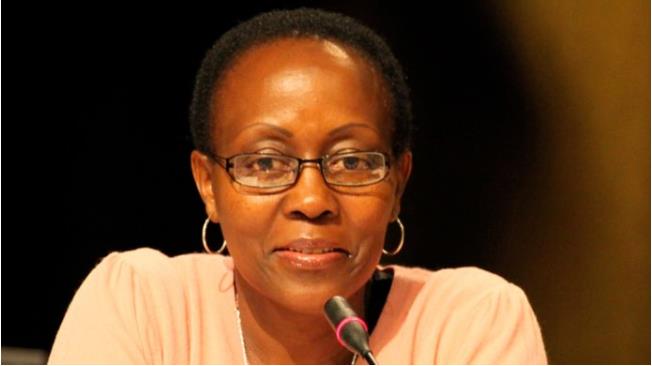
△ Elizabeth Murema
With the upcoming 26th Conference of the Parties (COP26) of the United Nations Framework Convention on Climate Change, what the United States has done is becoming the biggest uncertainty in the field of global environmental governance.
In this regard, Zhao Lijian, a spokesman for China’s Foreign Ministry, said a few days ago that the United States should change its utilitarian practices in participating in international affairs as soon as possible, shoulder its due international responsibilities and obligations, earnestly proceed from the well-being of people around the world and win the trust of the international community with practical actions.

△ Zhao Lijian
But what the world wants to know is, when will the United States, which has refused to ratify the Convention on Biological Diversity for decades, retreat when it wants to enter the Paris Agreement … …
Planning Wang Jian
Reporter Wang Hongling
Editor Zhang Han
Qian Shen Wang Jian Liu Yiyao